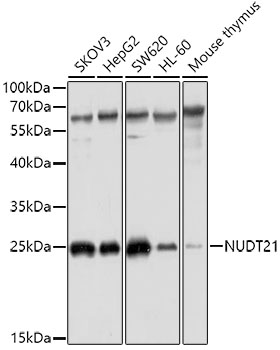-
Product Name
NUDT21 Polyclonal Antibody
- Documents
-
Description
Polyclonal antibody to NUDT21
-
Tested applications
WB
-
Species reactivity
Human, Mouse
-
Alternative names
NUDT21 antibody; CFIM25 antibody; CPSF5 antibody; nudix hydrolase 21 antibody
-
Isotype
Rabbit IgG
-
Preparation
Antigen: Recombinant fusion protein containing a sequence corresponding to amino acids 1-227 of human NUDT21 (NP_008937.1).
-
Clonality
Polyclonal
-
Formulation
PBS with 0.02% sodium azide, 50% glycerol, pH7.3.
-
Storage instructions
Store at -20℃. Avoid freeze / thaw cycles.
-
Applications
WB 1:200 - 1:2000
-
Validations

Western blot - NUDT21 Polyclonal Antibody
Western blot analysis of extracts of various cell lines, using NUDT21 antibody at 1:1000 dilution.Secondary antibody: HRP Goat Anti-Rabbit IgG (H+L) at 1:10000 dilution.Lysates/proteins: 25ug per lane.Blocking buffer: 3% nonfat dry milk in TBST.Detection: ECL Basic Kit .Exposure time: 5s.
-
Background
Component of the cleavage factor Im (CFIm) complex that functions as an activator of the pre-mRNA 3'-end cleavage and polyadenylation processing required for the maturation of pre-mRNA into functional mRNAs. CFIm contributes to the recruitment of multiprotein complexes on specific sequences on the pre-mRNA 3'-end, so called cleavage and polyadenylation signals (pA signals). Most pre-mRNAs contain multiple pA signals, resulting in alternative cleavage and polyadenylation (APA) producing mRNAs with variable 3'-end formation. The CFIm complex acts as a key regulator of cleavage and polyadenylation site choice during APA through its binding to 5'-UGUA-3' elements localized in the 3'-untranslated region (UTR) for a huge number of pre-mRNAs. NUDT21/CPSF5 activates indirectly the mRNA 3'-processing machinery by recruiting CPSF6 and/or CPSF7. Binds to 5'-UGUA-3' elements localized upstream of pA signals that act as enhancers of pre-mRNA 3'-end processing. The homodimer mediates simultaneous sequence-specific recognition of two 5'-UGUA-3' elements within the pre-mRNA. Plays a role in somatic cell fate transitions and pluripotency by regulating widespread changes in gene expression through an APA-dependent function (By similarity). Binds to chromatin (By similarity). Binds to, but does not hydrolyze mono- and di-adenosine nucleotides.
Related Products / Services
Please note: All products are "FOR RESEARCH USE ONLY AND ARE NOT INTENDED FOR DIAGNOSTIC OR THERAPEUTIC USE"
